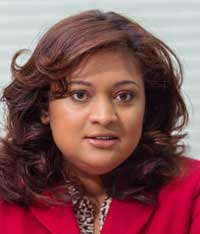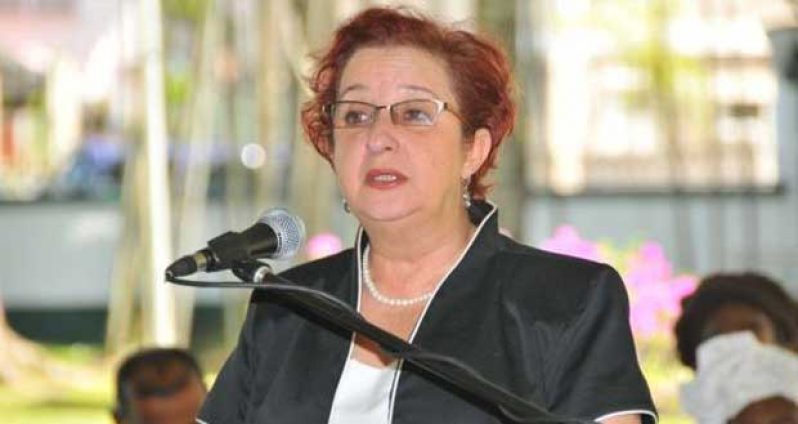Diplomats must respect sovereignty, and not meddle in internal politics
–US Ambassador repeatedly breached norms, conventions
PRESIDENTIAL Advisor on Governance, Madame Gail Teixeira, has cleared the air on the sometimes acrimonious relationship between the Guyana Government and outgoing US Ambassador Brent Hardt.She said Friday that in spite of the tension that existed between Ambassador Hardt and the Government of Guyana, diplomatic relations between Guyana and the US have been, and continue to be, cordial.
Speaking on a special programme on the National Communications Network (NCN) along with Education Minister, Ms Priya Manickchand, the Presidential Advisor said there have been significant achievements in Guyana/US relations over the last seven years, particularly in the area of security, in which the US has extended tangible support to Guyana.

The recent announcement of the establishment of a DEA Office is also a welcome development, and is one that was long in the pipeline.
However, there have also been areas where both countries have had different national interests and where views collided. One of the issues that resulted in the US being at loggerheads with not only Guyana, but several other countries as well, was imposition of the Foreign Account Tax Compliance Act (FATCA).
FATCA is a US Federal law with which countries, especially those in the developing world, have to comply, even though they were not consulted on its provisions.
US LEAD PROJECT
There has, most recently, been the US Lead project, which also attracted a great deal of controversy; and Teixeira explained that in initiating this project, there was a sudden halt on the conventions and norms that have been developed between the countries.
A project was created and presented to the Government, which the Government objected to. The main objections had to do with the lack of consultation, particularly as it relates to the financing of political parties.
“The fact that Guyana, as a little country, stood up and said that we are not going to allow this; that any project has to be with the Guyana Government’s agreement…despite the position of the Government and its report to the US Secretary of State and all the other procedures we went through, they still brought in a Chief-of-Missions for USAID, who harmed the relations with the Government and USAID in relation to what its activities were, to the point where the Guyana Government said we were revoking his work permit,” Teixeira outlined.
As the US ambassador pressed forward to implement this project despite the Government’s objections, the US Administration from Washington intervened and placed the project on a temporary pause while both parties went back to the drawing board in order to get a project that was mutually acceptable. The contentious components of the project were subsequently worked out, and agreement was reached on the way forward.
“We showed, as a country standing on principle and mutual respect, that we could get back to the table and resolve a number of issues,” Teixeira said.
MEDDLING
Teixeira said the normal conventions that apply to ambassadors and diplomats serving in another country is one of mutual respect and recognition of the sovereignty of each country, so as not to interfere in the internal politics of any given country.
She said that what unfolded at the reception, hosted on July 2 in commemoration of the 238th Independence Anniversary of the US, where the Government called out the ambassador for meddling in Guyana’s internal affairs, was the result of an accumulation of problems, all of which the Government sought repeatedly to address privately with the ambassador.
Minister Manickchand, in her capacity as acting Foreign Affairs Minister, delivered an address on behalf of the Government of Guyana, placing on record the Administration’s repudiation of Ambassador Hardt’s behavior, particularly over the last year and a half.
Minister Manickchand said, “This Ambassador, in my respectful view and the view of the Cabinet, has breached repeatedly all the norms and conventions that govern how countries relate to each other through their diplomatic channels.”
Madame Teixeira noted that the Government has been talking over and over about some of the offensive statements Ambassador Hardt had made regarding the President, his party, and the country as a whole — all of which he ignored. She described his behaviour as “rogue”, and reiterated that he has crossed the red line, especially when he practically called for an insurrection.
Ambassador Hardt, in his speech on July 2, said Guyanese should do what the Americans did in 1776 when they took up arms against Britain. He then added that Guyanese would receive the support of the US, but they must be ready to fight for themselves.
With regard to the heckling while Minister Manickchand was delivering her remarks, Teixeira clarified that despite what is being conveyed by the sensational headlines, not everyone who was present at the reception was disruptive.
She said the majority of those who made loud noises were people who are known as “haters” of the Government.
Reference was made to the Ambassador’s recent address to the Blue Caps, a new NGO comprising a group of young people, in which he launched an attack on the Executive President of Guyana, and mocked the PPP/C and its General Secretary, Clement Rohee.
Minister Manickchand reminded that Ambassador Hardt accused the President of being inconsistent, and of doing illegal and unconstitutional things; and she questioned why those outbursts were not condemned by the groups and political parties that are now coming out to criticise the Government for reprimanding the ambassador.
LOCAL GOVERNMENT ELECTIONS
The ambassador accused the President of deliberately delaying the holding of Local Government Elections. However, Teixeira said the ambassador is fully aware that the Guyana Elections Commission (GECOM) is far from ready to hold these long-awaited polls.
If the Government calls these elections in August, as the Opposition is pushing for, then thousands of Guyanese would be disenfranchised as a result of GECOM’s lack of preparedness.
Teixeira also questioned if the ambassador indeed felt passionately about certain burning issues in Guyana, why he chose to continuously criticise the Government over Local Government Elections, and not harp on the opposition parties over non-passage of the Anti-Money Laundering and Countering the Financing of Terrorism (Amendment) Bill, an issue which is of equal import to the country’s stability and economic well-being.
(GINA)



.jpg)









